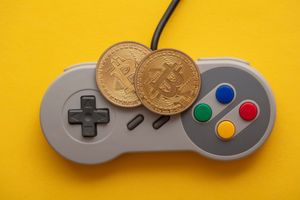

What Is Web3 Gaming
Did you know that nearly 75% of gamers are enthusiastic to convert their virtual goods into assets that hold real-world value? This shift is largely driven by the advent of Web3 gaming, a platform where you can truly own and trade your in-game assets as digital collectibles on the blockchain. But beyond just trading, there's a layer of democratic participation you might find intriguing. Players like you can influence game developments and rules, turning gaming into more than just a pastime but a place where your voice and choices have tangible impacts. Now, imagine the possibilities that open up when your gaming experience is no longer confined to just playing by the rules set by developers. Intrigued? Let's explore what this could mean for the future of gaming.
Defining Web3 Gaming
Web3 gaming revolutionizes traditional gaming by integrating blockchain technology, enabling decentralized asset ownership and player-driven economies. This shift not only alters how you interact within digital worlds but also redefines ownership models.
In Web3 gaming, you don't merely purchase a license to use in-game items; instead, you own these assets outright. This means they can be bought, sold, or traded on open markets without platform restrictions. Ownership is recorded on the blockchain, ensuring transparency and security, and is primarily facilitated through non-fungible tokens (NFTs).
Each NFT represents a unique in-game asset, which could range from cosmetic skins to potentially game-altering equipment. This model empowers you, as a player, turning your gaming investments into real-world assets that possess tangible value outside the game itself.
However, this innovative approach comes with its set of regulatory challenges. The decentralized nature of blockchain creates a complex environment for regulatory oversight, often leading to legal grey areas. Different countries may have varied stances on cryptocurrency and NFTs, affecting how these assets are treated legally. Additionally, the integration of real economic value into gaming raises questions about consumer protection, taxation, and even potential for misuse such as money laundering.
As you navigate through Web3 gaming, you're not just a player but a stakeholder. This freedom to manage and monetize your digital assets as you see fit is groundbreaking, yet it requires you to be aware of the regulatory frameworks that continue to evolve. Understanding these elements is important as you step into this new era of gaming, where your actions and investments have a significant impact on both virtual and real economies.


The Design Lab Blog
Technology Behind Web3 Games
Diving into the core of Web3, blockchain technology forms the backbone, facilitating decentralized transactions and asset management across gaming platforms. At the heart of this tech, you'll find a complex but robust mechanism that guarantees every transaction or game event is recorded immutably on a distributed ledger. This is pivotal for maintaining transparency and security, empowering you to manage your digital assets without the need for traditional intermediaries.
To handle the surge in users and transactions within Web3 games, blockchain scalability is a critical focus. Techniques like sharding, which divides the blockchain into smaller, manageable segments, and layer 2 solutions, such as rollups, enhance throughput and reduce latency on the network. These innovations are vital as they ensure that as the gaming universe expands, your experience remains smooth and uninterrupted.
Meanwhile, cryptocurrency regulation looms as both a challenge and an essential framework within the Web3 space. While you might cherish the freedom that decentralized platforms offer, regulatory measures are being crafted to protect users from fraud and ensure stability in the crypto market. This regulatory landscape influences how assets are used and traded in games, ensuring that while innovation continues, user protection remains a priority.
Understanding these technologies and frameworks gives you the upper hand in exploring the Web3 gaming world. With knowledge of how blockchain operates and the implications of regulatory policies, you're better equipped to leverage the full potential of decentralized gaming, maintaining both your freedom and security in the digital domain.
Benefits for Players
As a player in the Web3 gaming universe, you'll enjoy unparalleled control over your digital assets and in-game transactions. This control is central to the concept of player autonomy, a significant advantage allowing you to manage, trade, and leverage your assets without third-party intervention. Your digital collectibles, earned through gameplay or purchased, are secured on a blockchain, providing a verifiable and immutable ownership record. This means they can be traded or sold in global markets, not just within the same game or platform, enhancing their value and utility.
Enhanced interactivity is another key benefit. Unlike traditional games where content and narrative paths are rigidly set by developers, Web3 games often offer dynamic storylines and environments shaped by players' actions and decisions. This interactivity is facilitated by decentralized autonomous organizations (DAOs) where you can vote on game developments and changes, contributing to the game's evolution and direction. This level of engagement not only makes gaming more immersive but also ensures that the game continually adapts to community desires, maintaining relevance and interest.
Moreover, the integration of smart contracts automates transactions and enforces the rules of the game in a transparent way. This reduces the likelihood of fraud and cheating, ensuring a fair gaming environment. The use of blockchain technology also means that network downtime and data loss are minimized, thanks to distributed nodes that enhance game resilience and availability.


Web3 Geek
Impact on Game Developers
While players enjoy enhanced autonomy and asset control, game developers face a new paradigm in game creation and monetization strategies with Web3 technologies. This shift isn't just about adopting new tools; it represents a significant transformation in how you, as a developer, approach your craft and sustain your career.
Here are three major impacts of Web3 on game developers:
Decentralization of Development Processes With blockchain, the development process can become more decentralized, not just in terms of technology but also in governance. You might find yourself participating in or leading a distributed team where development decisions are made democratically. This can lead to a more collaborative and inclusive working environment, but it also requires you to adapt your skills to manage and thrive in such settings.
New Revenue Models Traditional gaming revenue streams are supplemented or replaced by tokenomics, which can provide continuous revenue through mechanisms like play-to-earn models, asset trading, and in-game economies based on cryptocurrencies. This shift necessitates a deep understanding of economic models and player incentives, pushing you to innovate beyond the conventional pay-to-play or ad-supported models.
Enhanced Focus on Developer Retention As the competition for skilled developers intensifies, there's a stronger emphasis on developer retention. You'll likely see more opportunities for profit-sharing, token ownership, and other incentives that align your long-term interests with the success of the game.
Skill adaptation is essential; you must stay abreast of blockchain technology, smart contracts, and cryptocurrency trends to remain relevant and competitive. Embrace these changes, and you'll not only secure your place in the future of gaming but potentially lead it.
Future Trends in Web3 Gaming
Looking ahead, the progression of Web3 gaming will likely prioritize interoperability, enhancing the seamless integration of diverse gaming ecosystems. This push for interoperability isn't just a technical upgrade; it's a foundational shift that will allow you to explore your digital assets and gaming persona across multiple platforms without restriction. Imagine playing in a virtual world where your achievements and inventory move with you—this is the future where your gaming experience is no longer isolated but interconnected.
However, as this ecosystem expands, you'll face significant regulatory challenges. Governments and regulatory bodies are still grappling with how to manage and legislate digital assets. These entities aren't only looking to protect users but also to understand how the value generated within these games impacts the real economy. You'll need to navigate these evolving laws to maximize your autonomy without falling foul of new regulations.
Moreover, player autonomy will become a central pillar in Web3 gaming. This isn't just about owning your in-game items; it's about having a real stake in the game worlds you inhabit. Blockchain technology promises to give you more control over game governance, allowing for voting on game rules or the direction of the storyline. Your engagement will directly influence the game's development, making you a co-creator, not just a participant.
As you explore further into Web3 gaming, prepare to adapt to these innovations that aim to empower you but also come with a set of new responsibilities and challenges. The freedom you desire in gaming is on the horizon, shaped by both technological advancements and the necessary frameworks to support them.
